英语比较级和最高级
英语比较级 最高级
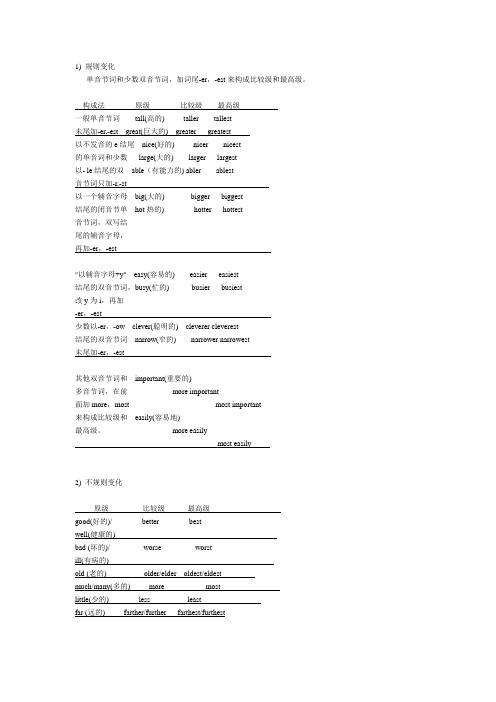
1) 规则变化单音节词和少数双音节词,加词尾-er,-est来构成比较级和最高级。
构成法原级比较级最高级一般单音节词tall(高的)taller tallest未尾加-er,-est great(巨大的)greater greatest以不发音的e结尾nice(好的)nicer nicest的单音词和少数large(大的)larger largest以- le结尾的双able(有能力的) abler ablest音节词只加-r,-st以一个辅音字母big(大的)bigger biggest结尾的闭音节单hot热的)hotter hottest音节词,双写结尾的辅音字母,再加-er,-est"以辅音字母+y"easy(容易的)easier easiest结尾的双音节词,busy(忙的)busier busiest改y为i,再加-er,-est少数以-er,-ow clever(聪明的)cleverer cleverest结尾的双音节词narrow(窄的)narrower narrowest未尾加-er,-est其他双音节词和important(重要的)多音节词,在前more important面加more,most most important来构成比较级和easily(容易地)最高级。
more easilymost easily2) 不规则变化原级比较级最高级good(好的)/better bestwell(健康的)bad (坏的)/worse worstill(有病的)old (老的)older/elder oldest/eldestmuch/many(多的)more mostlittle(少的)less leastfar (远的)farther/further farthest/furthest1)在否定句或疑问句中可用so…as。
He cannot run so/as fast as you.2)当as…as 中间有名词时采用以下格式。
英语中的比较级和最高级

英语中的比较级和最高级比较级和最高级是英语中用来对比两个或多个事物在特定品质或性质上的程度的语法结构。
在英语中,比较级和最高级分别用于形容词和副词的比较。
形容词的比较级和最高级比较级形容词的比较级用于比较两个事物在某种特定品质上的程度。
比较级的形式通常在形容词词尾加上 -er,或在前面加上 more。
例如:- old(年长的)→ older(更年长的)- beautiful(美丽的)→ more beautiful(更美丽的)最高级形容词的最高级用于比较三个或更多事物在某种特定品质上的程度,表示最高程度。
最高级的形式通常在形容词词尾加上 -est,或在前面加上 most。
例如:- old(年长的)→ oldest(最年长的)- beautiful(美丽的)→ most beautiful(最美丽的)副词的比较级和最高级比较级副词的比较级用于比较两个动作或状态在某种特定品质上的程度。
比较级的形式通常在副词词尾加上 -er,或在前面加上 more。
例如:- quickly(迅速地)→ more quickly(更迅速地)- slowly(慢慢地)→ slower(更慢慢地)最高级副词的最高级用于比较三个或更多动作或状态在某种特定品质上的程度,表示最高程度。
最高级的形式通常在副词词尾加上-est,或在前面加上 most。
例如:- quickly(迅速地)→ most quickly(最迅速地)- slowly(慢慢地)→ slowest(最慢慢地)以比较级和最高级来表达程度的变化在英语中非常常见,它们可以帮助我们更准确地描述事物之间的差异和特点。
在使用比较级和最高级时,需要注意形容词和副词的不规则变化形式,并且要根据上下文来判断使用哪种形式。
以上是关于英语中比较级和最高级的简要介绍。
小学英语中的比较级和最高级的使用
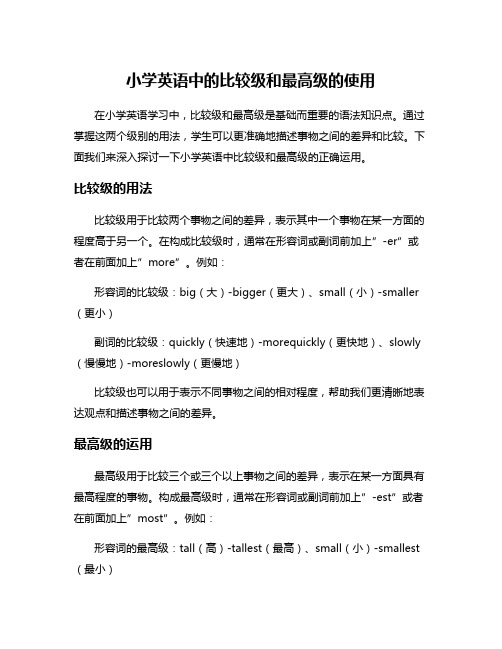
小学英语中的比较级和最高级的使用在小学英语学习中,比较级和最高级是基础而重要的语法知识点。
通过掌握这两个级别的用法,学生可以更准确地描述事物之间的差异和比较。
下面我们来深入探讨一下小学英语中比较级和最高级的正确运用。
比较级的用法比较级用于比较两个事物之间的差异,表示其中一个事物在某一方面的程度高于另一个。
在构成比较级时,通常在形容词或副词前加上”-er”或者在前面加上”more”。
例如:形容词的比较级:big(大)-bigger(更大)、small(小)-smaller (更小)副词的比较级:quickly(快速地)-morequickly(更快地)、slowly (慢慢地)-moreslowly(更慢地)比较级也可以用于表示不同事物之间的相对程度,帮助我们更清晰地表达观点和描述事物之间的差异。
最高级的运用最高级用于比较三个或三个以上事物之间的差异,表示在某一方面具有最高程度的事物。
构成最高级时,通常在形容词或副词前加上”-est”或者在前面加上”most”。
例如:形容词的最高级:tall(高)-tallest(最高)、small(小)-smallest (最小)副词的最高级:slowly(慢慢地)-mostslowly(最慢地)、quickly (快速地)-mostquickly(最快地)最高级帮助我们在描述一组事物中找出在某一方面最突出的事物,使句子更加生动有趣。
通过掌握比较级和最高级的用法,小学生可以在英语学习中更准确地表达自己的想法,丰富句子结构,提高表达能力。
这两个语法知识点是构建英语语言基础的重要组成部分,希望同学们能够在课堂上多加练习,灵活运用,提升英语水平。
掌握比较级和最高级,让我们的英语表达更加生动和精确,希望大家在学习中能够善加利用,取得优异的成绩!。
比较级最高级变化规则总结
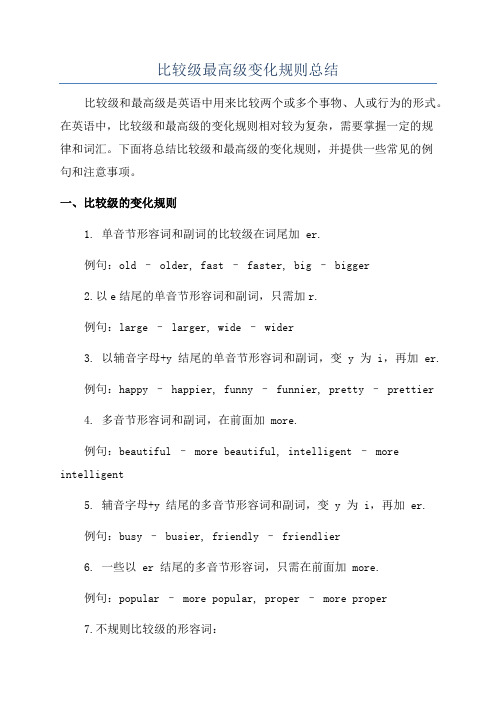
比较级最高级变化规则总结比较级和最高级是英语中用来比较两个或多个事物、人或行为的形式。
在英语中,比较级和最高级的变化规则相对较为复杂,需要掌握一定的规律和词汇。
下面将总结比较级和最高级的变化规则,并提供一些常见的例句和注意事项。
一、比较级的变化规则1. 单音节形容词和副词的比较级在词尾加 er.例句:old – older, fast – faster, big – bigger2.以e结尾的单音节形容词和副词,只需加r.例句:large – larger, wide – wider3. 以辅音字母+y 结尾的单音节形容词和副词,变 y 为 i,再加 er.例句:happy – happier, funny – funnier, pretty – prettier4. 多音节形容词和副词,在前面加 more.例句:beautiful – more beautiful, intelligent – more intelligent5. 辅音字母+y 结尾的多音节形容词和副词,变 y 为 i,再加 er.例句:busy – busier, friendly – friendlier6. 一些以 er 结尾的多音节形容词,只需在前面加 more.例句:popular – more popular, proper – more proper7.不规则比较级的形容词:多的:many – more, much – more少的:little –less, as/so … as二、最高级的变化规则1. 单音节形容词和副词的最高级在词尾加 est.例句:old – oldest, fast – fastest, big – biggest2. 以 e 结尾的单音节形容词和副词,只需加 st.例句:large – largest, wide – widest3. 以辅音字母+y 结尾的单音节形容词和副词,变 y 为 i,再加est.例句:happy – happiest, funny – funniest, pretty –prettiest4. 多音节形容词和副词,在前面加 most.例句:beautiful – most beautiful, intelligent – most intelligent5. 辅音字母+y 结尾的多音节形容词和副词,变 y 为 i,再加 est.例句:busy – busiest, friendly – friendliest6. 一些以 est 结尾的多音节形容词,只需在前面加 most.例句:popular – most popular, proper – most proper7.不规则最高级的形容词:多的:many – most, much – most少的:little – least三、注意事项1. 部分比较级和最高级形容词需要通过改变单词本身的拼写来变化。
初中英语比较级与最高级

初中英语比较级与最高级好的,以下是为您生成的 20 个关于初中英语比较级和最高级的相关内容:---## 一、单词1. **good / better / best**- 英语释义:of high quality; having the required qualities- 短语:be good at 擅长;do good to 对...有好处- 用法:“better”用于两者之间的比较,“best”用于三者或三者以上的比较。
- 例句:- This book is better than that one. (这本书比那本好。
)- She is the best student in our class. (她是我们班最好的学生。
)2. **bad / worse / worst**- 英语释义:not good; of poor quality- 短语:be bad for 对...有害- 用法:“worse”用于比较级,“worst”用于最高级。
- 例句:- His health is getting worse. (他的健康状况越来越差。
)- This is the worst movie I've ever seen. (这是我看过的最糟糕的电影。
)3. **many / more / most**- 英语释义:a large number of- 短语:many a 许多(后接单数名词);more and more 越来越多 - 用法:“more”表示“更多”,“most”表示“最多”。
- 例句:- There are more students in this school than in that one. (这所学校的学生比那所学校多。
)- He has the most friends of all. (在所有人中他朋友最多。
)4. **much / more / most**- 英语释义:a large amount of- 短语:much too 太;too much 太多- 用法:“more”用于比较级,“most”用于最高级。
比较级和最高级的构成
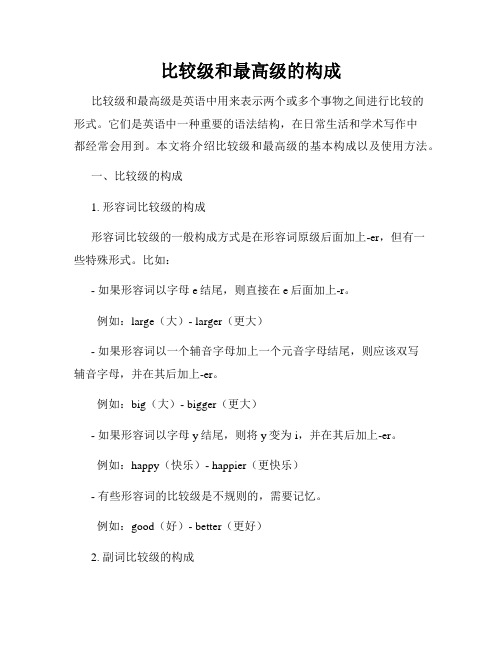
比较级和最高级的构成比较级和最高级是英语中用来表示两个或多个事物之间进行比较的形式。
它们是英语中一种重要的语法结构,在日常生活和学术写作中都经常会用到。
本文将介绍比较级和最高级的基本构成以及使用方法。
一、比较级的构成1. 形容词比较级的构成形容词比较级的一般构成方式是在形容词原级后面加上-er,但有一些特殊形式。
比如:- 如果形容词以字母e结尾,则直接在e后面加上-r。
例如:large(大)- larger(更大)- 如果形容词以一个辅音字母加上一个元音字母结尾,则应该双写辅音字母,并在其后加上-er。
例如:big(大)- bigger(更大)- 如果形容词以字母y结尾,则将y变为i,并在其后加上-er。
例如:happy(快乐)- happier(更快乐)- 有些形容词的比较级是不规则的,需要记忆。
例如:good(好)- better(更好)2. 副词比较级的构成副词比较级的构成方式是在副词原级后面加上-er,但也有一些特殊情况:- 如果副词以字母e结尾,则直接在e后面加上-r。
例如:late(晚)- later(更晚)- 如果副词以字母y结尾,则将y变为i,并在其后加上-er。
例如:happy(快乐地)- happier(更快乐地)- 有些副词的比较级是不规则的,需要记忆。
例如:well(好)- better(更好)二、最高级的构成1. 形容词和副词最高级的构成形容词和副词最高级的构成方式是在形容词或副词的比较级前面加上"the",并在其后加上-est。
同样,也有一些特殊形式需要记忆:- 如果形容词或副词以字母e结尾,则在e后面加上-st。
例如:large(大)- largest(最大)- 如果形容词或副词以一个辅音字母加上一个元音字母结尾,则应该双写辅音字母,并在其后加上-est。
例如:big(大)- biggest(最大)- 如果形容词或副词以字母y结尾,则将y变为i,并在其后加上-est。
英语比较级最高级用法全攻略
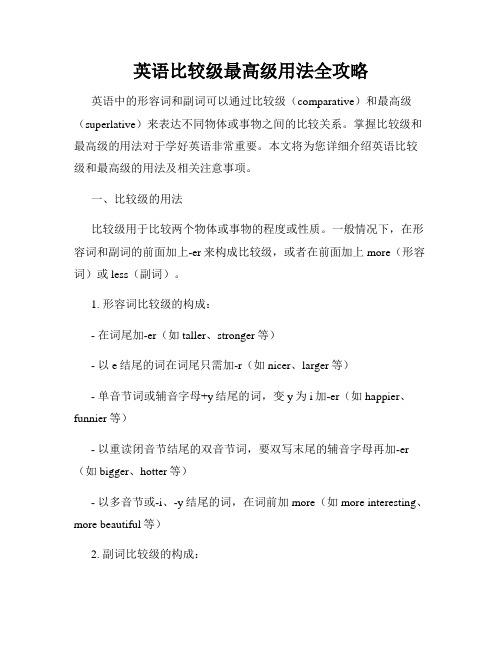
英语比较级最高级用法全攻略英语中的形容词和副词可以通过比较级(comparative)和最高级(superlative)来表达不同物体或事物之间的比较关系。
掌握比较级和最高级的用法对于学好英语非常重要。
本文将为您详细介绍英语比较级和最高级的用法及相关注意事项。
一、比较级的用法比较级用于比较两个物体或事物的程度或性质。
一般情况下,在形容词和副词的前面加上-er来构成比较级,或者在前面加上more(形容词)或less(副词)。
1. 形容词比较级的构成:- 在词尾加-er(如taller、stronger等)- 以e结尾的词在词尾只需加-r(如nicer、larger等)- 单音节词或辅音字母+y结尾的词,变y为i加-er(如happier、funnier等)- 以重读闭音节结尾的双音节词,要双写末尾的辅音字母再加-er (如bigger、hotter等)- 以多音节或-i、-y结尾的词,在词前加more(如more interesting、more beautiful等)2. 副词比较级的构成:- 在词尾加-er(如faster、sooner等)- 以e结尾的词只需加-r(如nicer、later等)- 辅音字母+y结尾的词,变y为i加-er(如easily、happily等)- 以多音节或ly结尾的词,在词前加more(如more carefully、more quickly等)例句:1. Peter is taller than John.(比较级)2. She is more beautiful than her sister.(比较级)3. Tom runs faster than his brother.(比较级)二、最高级的用法最高级用于描述三个或三个以上的物体或事物之间的比较关系,表示最高程度或性质。
一般情况下,在形容词或副词前加上-the前缀,或者使用most(形容词)或least(副词)。
什么是比较级和最高级
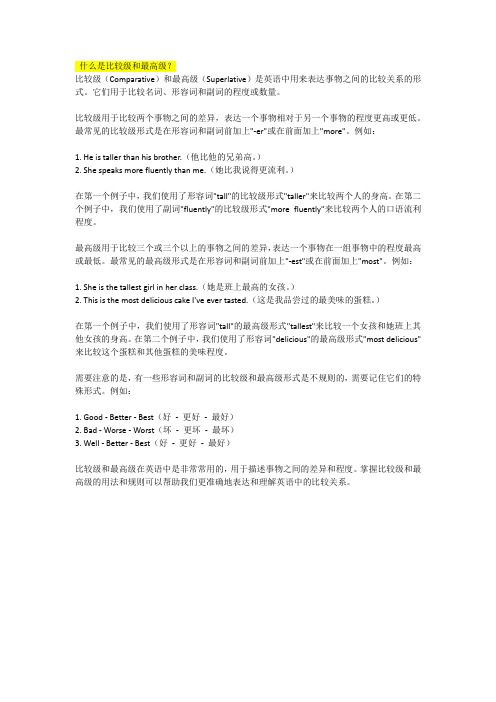
什么是比较级和最高级?比较级(Comparative)和最高级(Superlative)是英语中用来表达事物之间的比较关系的形式。
它们用于比较名词、形容词和副词的程度或数量。
比较级用于比较两个事物之间的差异,表达一个事物相对于另一个事物的程度更高或更低。
最常见的比较级形式是在形容词和副词前加上"-er"或在前面加上"more"。
例如:1. He is taller than his brother.(他比他的兄弟高。
)2. She speaks more fluently than me.(她比我说得更流利。
)在第一个例子中,我们使用了形容词"tall"的比较级形式"taller"来比较两个人的身高。
在第二个例子中,我们使用了副词"fluently"的比较级形式"more fluently"来比较两个人的口语流利程度。
最高级用于比较三个或三个以上的事物之间的差异,表达一个事物在一组事物中的程度最高或最低。
最常见的最高级形式是在形容词和副词前加上"-est"或在前面加上"most"。
例如:1. She is the tallest girl in her class.(她是班上最高的女孩。
)2. This is the most delicious cake I've ever tasted.(这是我品尝过的最美味的蛋糕。
)在第一个例子中,我们使用了形容词"tall"的最高级形式"tallest"来比较一个女孩和她班上其他女孩的身高。
在第二个例子中,我们使用了形容词"delicious"的最高级形式"most delicious"来比较这个蛋糕和其他蛋糕的美味程度。
- 1、下载文档前请自行甄别文档内容的完整性,平台不提供额外的编辑、内容补充、找答案等附加服务。
- 2、"仅部分预览"的文档,不可在线预览部分如存在完整性等问题,可反馈申请退款(可完整预览的文档不适用该条件!)。
- 3、如文档侵犯您的权益,请联系客服反馈,我们会尽快为您处理(人工客服工作时间:9:00-18:30)。
一、比较级和最高级的讲解变化规则1.一般单音节词和少数以-er,-ow结尾的双音节词,比较级在后面加-er,最高级在后面加-est;(1)单音节词如:small→smaller→smallestshort→shorter→shortesttall→taller→tallestgreat→greater→greatest(2)双音节词如:clever→cleverer→cleverestnarrow→narrower→narrowest2.以不发音e结尾的单音节词,比较在原级后加-r,最高级在原级后加-st;如:large→larger→largest nice→nicer→nicest able→abler→ablest3.在重读闭音节(即:辅音+元音+辅音)中,先双写末尾的辅音字母,比较级加-er,最高级加-est;如:big→bigger→biggest hot→hotter→hottest fat→fatter→fattest4.以“辅音字母+y”结尾的双音节词,把y改为i,比较级加-er,最高级加-est;如:easy→easier→easiest heavy→heavier→heaviestbusy→busier→busiest happy→happier→happiest5.其他双音节词和多音节词,比较级在前面加more,最高级在前面加most;如:beautiful→more beautiful→most beautifuldifferent→more different→most differenteasily→more easily→most easily注意:(1)形容词最高级前通常必须用定冠词 the,副词最高级前可不用。
例句: The Sahara is the biggest desert in the world.(2)形容词most前面没有the,不表示最高级的含义,只表示"非常"。
It is a most important problem.=It is a very important problem.6.有少数形容词、副词的比较级和最高级是不规则的,必须熟记。
如:good→better→best well→better→bestbad→worse→worst ill→worse→worstold→older/elder→oldest/eldestmany/much→more→most little→less→leastfar →further/farther→ furthest/farthest一、写出下列形容词和副词的比较级形式。
1. long ______ _2.tidy____ _ _3.hot ______ _______4. large_____ ___5.thin_____ ____6.good_____ ________7. bad ___ ______ 8.little____ _____ 9.sincere_______ _____ 10.much_____ __11.early___ ______ 12.fast _____ ________13.hard _____ __14.difficult___ ______15.badly____ ________16.far____ _____17.carefully___ ______18.instructive____ ____ 19.easily___ ___20.often____ ________二、形容词、副词的比较级和最高级的用法1.“A + be +形容词比较级+ than + B” 意思为“A比B更……”。
如:This tree is taller than that one. 这棵树比那棵树高。
注意:① 在含有连词than的比较级中,前后的比较对象必须是同一范畴,即同类事物之间的比较。
②在比较级前面使用much,表示程度程度“强得多”。
如:A watermelon is much bigger than an apple.③ very, quite一般只能修饰原级,不能修饰比较级。
2.“比较级 + and + 比较级”或“more and more +原级”表示“越来越……”如:It becomes warmer and warmer when spring comes.春天来了,天气变得越来越暖和了。
It is getting cooler and cooler.天气越来越凉爽。
The wind became more and more heavily.风变得越来越大。
Our school is becoming more and more beautiful.我们的学校变得越来越美丽。
3.在含有or的选择疑问句中,如果有两者供选择,前面的形容词要用比较级形式。
如:Who is taller,Tim or Tom? 谁更高,Tim还是Tom?4. “the +比较级……, the+比较级”,表示“越……越……”。
The more money you make, the more you spend.钱你赚得越多,花得越多。
The sooner,the better.越快越好。
5. 表示倍数的比较级用法:①. A is …times the size /height/length/width of B.如:The new building is three times the height of the old one.这座新楼比那座旧楼高三倍。
(新楼是旧楼的四倍高)②. A is …times as big /high/long/wide/large as B.如:Asia is four times as large as Europe.亚洲是欧洲的四倍大。
(亚洲比欧洲大三倍)③. A is …times larger /higher/longer/wider than B.如:Our school is twice bigger than yours.我们学校比你们学校大两倍。
6.形容词、副词的最高级形式主要用来表示三者或三者以上人或事物的比较,表示“最……”的意思。
句子中有表示范围的词或短语。
如:of the three, in our class等等。
如:He is the tallest in our class.他在我们班里是最高的。
He likes English best of all the subjects在所有学科中,他最喜欢英语。
7."否定词语+比较级","否定词语+ so… as"结构表示最高级含义。
Nothing is so easy as this.=Nothing is easier than this.=This is the easiest thing.8. 比较级与最高级的转换:Mike is the most intelligent in his class.=Mike is more intelligent than any other student in his class9.修饰比较级和最高级的词1)可修饰比较级的词①.a bit, a little, rather, much, far, by far, many, a lot, lots, a great deal, any, still, even等。
②. 还可以用表示倍数的词或度量名词作修饰语。
③. 以上词(除by far)外,必须置于比较级形容词或副词的前面。
注意:使用最高级要注意将主语包括在比较范围内。
(错) Tom is the tallest of his three brothers.(对) Tom is the tallest of the three brothers.2)下列词可修饰最高级:by far, far, much, mostly, almost。
This hat is nearly / almost the biggest.注意:a. very可修饰最高级,但位置与much不同。
This is the very best.This is much the best.b. 序数词通常只修饰最高级。
Africa is the second largest continent.10.要避免重复使用比较级。
(错) He is more cleverer than his brother.(对) He is more clever than his brother.(对) He is cleverer than his brother.11.要避免将主语含在比较对象中。
(错) China is larger that any country in Asia.(对) China is larger than any other country in Asia.12.要注意对应句型,遵循前一致的原则。
The population of Shanghai is larger than that of Beijing.It is easier to make a plan than to carry it out.13.要注意冠词的使用,后有名词的时候,前面才有可能有名词。
比较:Which is larger, Canada or Australia?Which is the larger country, Canada or Australia?She is taller than her two sisters.She is the taller of the two sisters.二、根据句意,用所括号内所级形容词的比较等级形式填空:1. Bob is _________ ( young ) than Fred but ___________ (tall) thanFred.2. Yingtian is not as ___________ (tall) as Yongxian.3. Almost all the students' faces are the same but Li Deming looks_______(fat) than before .4.Which is _________ (heavy), a hen or a chicken?5.-- How _________ (tall) is Sally?-- She' s 1.55 metres ________ (tall). What about Xiaoling? -- She' s only 1.40 metres ________(tall). She is much _______(short)than Sally.She is also the _______ (short) girl in the class.6. He is ______ (bad) at learning maths. He is much _______ (bad) atChinese and he is the _________ (bad) at English.7. Annie says Sally is the ________ (kind) person in the world.8.He is one of the_______ __(friendly) people in the class, Ithink.9. A dictionary is much (expensive) than astory-book.10. An orange ia a little ______ (big) than an apple, but much ________(small) than a watermelon.11. The Changjiang River is the _______ (long) river in China.12. Sue is a little _________ __ (beautiful) than her sister.13.My room is not as _________ (big) as my brother' s.14.--How difficult is physics? --I' m not sure.-- Is it ________ (difficult) than maths? -- I don't think so.15.-- Annie plays the piano very ___________ (well).-- Sue plays it _____ (well) than Annie. And Sally plays it the_______(well).16. Saturday is my _________ (busy) day in a week.17. Her mother is getting ____________(fat) and ________ (fat).18. I think it' s too expensive. I' d like a _____________ (cheap) one.19. He comes to school much ____________ (early) than I.20.This book is not as _____________ (interesting) as that one.21. Your classroom is __________(wide) and ___________(bright) than ours.22. Practise as __________ (much) as you can.23. The ________ (much), the ____________ (good).24. Nowadays(现在) English is ________ ( important ) than any other subject.25. Most of the students think a lion is much ________(dangerous) than a bear and it is the _______ ___ (dangerous) animal in the world.26. Mr. Smith is _________ man in this office. (rich)27. Winter is _________ season of the years. (cold)28.This radio is not so ________ as that one. (cheap)29. It is much _______ today than yesterday. (hot)30. She is a little ____ ____ than her classmates. (careful)31. ________ people came to the meeting than last time. (many)32. Which book is ________, this one or that one? (easy)33. My room is _______ than yours. (small)34. Hainan is _______ from Beijing than Hunan. (far)35. Skating is ____ ___ than swimming. (exciting)36. Jim is ____ ___ than all the others. (honest)37. Things are getting _______ and _______. (bad)38. The higher you climb, the _______ it will be. (cold)39. Now his life is becoming ________ and _____ __. (difficult)40. There are _______ boys than girls in our class. (few)一、1. nicer / nicest2. fatter / fattest3. slower / slowest4. drier / driest5. happier / happiest6. wetter / wettest7. more / most8. worse / worst9. less / least10. worse / worst11. thinner / thinnest12. farther / farthest 或 further / furthest13. earlier / earliest14. more careful / most careful15. more exciting / most exciting16. busier / busiest二、1. younger, taller2. tall3. fatter4. heavier5. tall, tall, tall, shorter, shortest6. bad, worse, worst7. kindest8. friendlier9. more expensive10. bigger, smaller11. longest12. more beautiful13. big14. more difficult15. well, better, best16. busiest17. fatter, fatter18. cheaper19. earlier20. interesting21. wider, brighter22. much23. more, better24. more important25. more dangerous, most dangerous26 richest27. coldest28cheap29hotter30 more careful31 More32 easier33smaller34 farter [further]35more exciting36 more honest37 worse, worse38 colder39 more, more difficult40 fewer。
